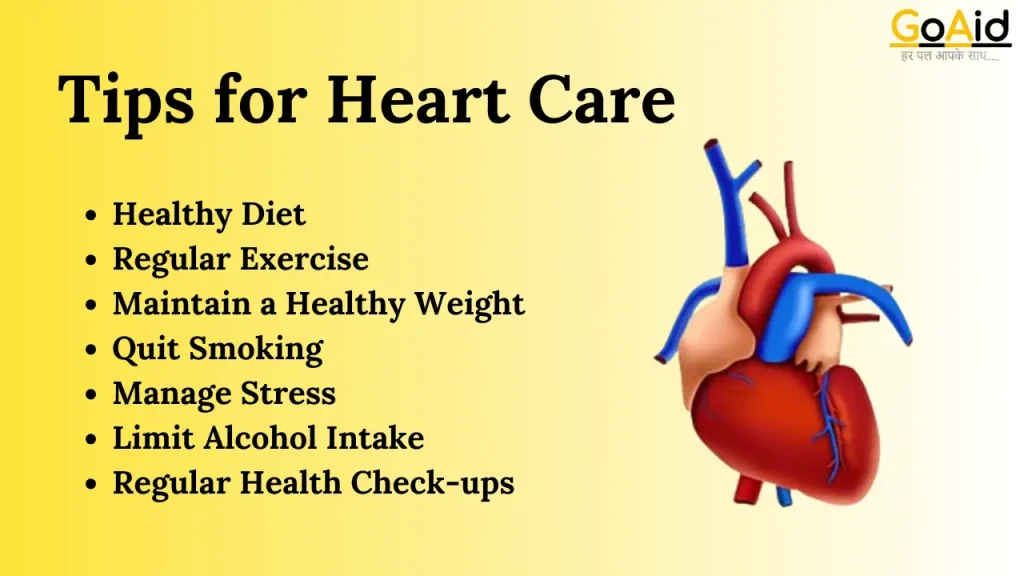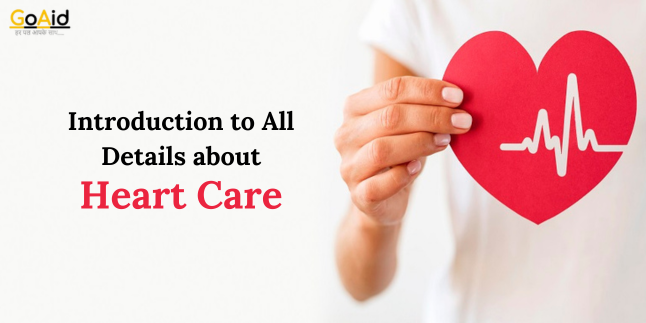In the entire world, millions of people are out there who suffering from heart diseases and issues. The heart is a component in our body that helps us to keep the blood circulation right in our body and that helps us to keep ourselves alive.
But this is not everything about heart care or heart; this is why, in this blog, we have added almost everything you need to know about heart care. If you are also excited to know about the heart, its functions, heart diseases, problems with the heart, and their respective treatment, along with doŌĆÖs and donŌĆÖts about heart care, then read our blog to the end.
So, letŌĆÖs start-
What is a Heart?
The heart is a vital muscular organ. This organ pumps blood throughout the body & supplies the oxygen and nutrients to tissues and removes the carbon dioxide and other wastes. Located in the chest cavity, it beats continuously. This is also orchestrating the circulatory system’s flow, which delivers essential substances to every cell. Our heart is composed of specialized cardiac muscle, the heart maintains its rhythmic contractions regulated by electrical impulses, ensuring efficient circulation and overall bodily function.
What does a Heart Do? ŌĆō Work of the Heart
The heart performs several critical functions. Knowing the functions of the heart also helps us with Heart Care.
- Pumping Blood: It circulates blood throughout the body, delivering oxygen and nutrients to tissues and organs.
- Maintaining Blood Pressure: By pumping blood, the heart helps maintain blood pressure necessary for circulation.
- Electrical Conduction: It generates electrical impulses that regulate the heartbeat, ensuring rhythmic contractions.
- Oxygenation: The heart receives deoxygenated blood from the body, pumps it to the lungs for oxygenation, and returns oxygen-rich blood to circulation.
- Waste Removal: It helps remove carbon dioxide and metabolic wastes from tissues through circulation.
Read More: 6 Signs of Heart Attack a Month Before
How does the heart work?
Knowing the workings of the heart also helps us with Heart Care. The heart works through a complex series of coordinated actions that involve both mechanical and electrical processes:
1. Mechanical Function:
- Atria Contraction: The cardiac cycle begins with the contraction of the atria (upper chambers), which pushes blood into the ventricles (lower chambers).
- Ventricular Contraction: The ventricles then contract, pumping blood out of the heart into the circulatory system. The right ventricle pumps blood to the lungs for oxygenation, while the left ventricle pumps oxygenated blood to the rest of the body.
2. Electrical Function:
- SA Node (Sinoatrial Node): Known as the heart’s natural pacemaker, the SA node initiates electrical impulses. These signals spread through the atria, causing them to contract.
- AV Node (Atrioventricular Node): The impulses then travel to the AV node, which briefly delays the signal to allow the ventricles to fill with blood.
- Bundle of His and Purkinje Fibers: From the AV node, the electrical impulses travel through the Bundle of His and Purkinje fibers, stimulating the ventricles to contract and pump blood out of the heart.
3. Cardiac Cycle:
- Diastole: The heart relaxes (diastole), allowing blood to flow into the atria and ventricles from the veins. The atria contract, pushing blood into the ventricles.
- Systole: The ventricles contract (systole), pumping blood out of the heart into the arteries. The cycle repeats, ensuring continuous circulation of blood throughout the body.
4. Regulation:
- Autonomic Nervous System: The heart rate and strength of contractions are regulated by the autonomic nervous system. Sympathetic nerves increase heart rate and force of contraction during stress or exercise, while parasympathetic nerves slow heart rate and reduce contraction force during rest.
- Valves: The heart has valves (tricuspid, pulmonary, mitral, and aortic) that ensure blood flows in one direction through the heart chambers and into the arteries.
How can we make the Heart Safe? ŌĆō Tips for Heart Care

Ensuring heart care involves adopting various lifestyle choices and habits that promote cardiovascular health. Here are Top-7 ways to keep the heart safe:
1. Healthy Diet:
- Description: To ensure heart care, consuming a balanced diet rich in fruits, vegetables, whole grains, lean proteins (like fish and poultry), and healthy fats (like olive oil and nuts) helps manage cholesterol levels, blood pressure, and weight.
- Impact: Lowering cholesterol and blood pressure reduces the risk of heart disease and stroke.
2. Regular Exercise:
- Description: To ensure heart care, Engaging in regular physical activity, such as brisk walking, jogging, swimming, or cycling, strengthens the heart muscle, improves circulation, and helps manage weight.
- Impact: Regular exercise lowers the risk of cardiovascular diseases, improves heart function, and enhances overall well-being.
3. Maintain a Healthy Weight:
- Description: To ensure heart care, Maintaining a healthy weight through a combination of diet and exercise reduces strain on the heart, lowers cholesterol levels, and decreases the risk of developing diabetes and hypertension.
- Impact: Healthy weight management reduces the likelihood of heart disease and other related conditions.
4. Quit Smoking:
- Description: To ensure heart care, we should know that Smoking damages blood vessels, raises blood pressure, and increases the risk of heart attack and stroke. Quitting smoking reduces these risks significantly& ensures our heart care.
- Impact: Eliminating smoking lowers the chances of cardiovascular disease and improves overall heart health.
5. Manage Stress:
- Description: Chronic stress contributes to elevated blood pressure and heart disease risk. Techniques like meditation, yoga, deep breathing exercises, and hobbies can help manage stress levels and ensure heart care.
- Impact: Effective stress management supports heart health by reducing strain on the cardiovascular system.
6. Limit Alcohol Intake:
- Description: Excessive alcohol consumption can raise blood pressure, contribute to weight gain, and increase the risk of heart disease and stroke. Moderation in alcohol consumption is key to heart care.
- Impact: Limiting alcohol intake reduces cardiovascular risks and supports overall heart health.
7. Regular Health Check-ups:
- Description: To ensure heart care, Regular visits to healthcare providers for check-ups and screenings (such as blood pressure, cholesterol, and blood sugar tests) help identify and manage risk factors early.
- Impact: Early detection and management of conditions like hypertension and high cholesterol prevent heart disease progression and promote long-term heart health.
All you need to know about Heart Care
If you are looking for heart care or care for your heart, then, first of all, you should know about the major heart problems and their symptoms and their respective treatment. After all that, we can proceed to know what we should do and what we should not do to keep our hearts healthy.
Different Types of Heart Problems, Symptoms, and Treatment
These are the different types of heart problems that are also common in heart patients. Knowing about these problems, their symptoms, and treatment helps us to ensure our heart care.
1. Coronary Artery Disease (CAD)
- Description: CAD occurs due to a buildup of plaque in the coronary arteries, leading to reduced blood flow to the heart muscle. This disease is almost the end of our heart care.
- Symptoms: Chest pain (angina), shortness of breath, fatigue, irregular heartbeat, dizziness.
- Treatment: Medications (e.g., statins, nitroglycerin), lifestyle changes (diet, exercise), angioplasty, coronary artery bypass surgery.
2. Heart Attack (Myocardial Infarction)
- Description: A heart attack occurs when a coronary artery becomes blocked, cutting off blood flow to part of the heart muscle.
- Symptoms: Chest pain or discomfort, shortness of breath, sweating, nausea, pain radiating to the arm or jaw, anxiety.
- Treatment: Immediate medical intervention (aspirin, thrombolytics), angioplasty with stent placement, medications (beta-blockers, ACE inhibitors), and cardiac rehabilitation.
3. Heart Failure
- Description: Heart failure happens when the heart cannot pump blood effectively to meet the body’s needs.
- Symptoms: Fatigue, shortness of breath (especially during exertion or when lying down), swelling in legs and ankles, rapid or irregular heartbeat, persistent cough.
- Treatment: Medications (diuretics, ACE inhibitors), lifestyle changes (salt restriction, weight management), cardiac devices (pacemaker, implantable cardioverter-defibrillator), heart transplant in severe cases.
4. Arrhythmia
- Description: Arrhythmias are abnormal heart rhythms, which can be too slow, too fast, or irregular.
- Symptoms: Palpitations (rapid or irregular heartbeat sensation), dizziness, fainting, chest discomfort, shortness of breath.
- Treatment: Medications (antiarrhythmics, beta-blockers), cardioversion (electric shock to restore normal rhythm), catheter ablation, implantable devices (pacemaker, implantable cardioverter-defibrillator).
5. Atrial Fibrillation (AFib)
- Description: AFib is a type of arrhythmia where the heart’s upper chambers (atria) beat irregularly and out of sync with the lower chambers (ventricles).
- Symptoms: Palpitations, weakness, fatigue, dizziness, chest discomfort, shortness of breath.
- Treatment: Medications (blood thinners, rate or rhythm control drugs), cardioversion, catheter ablation, lifestyle changes (alcohol moderation, stress management).
6. Heart Valve Disease
- Description: Heart valve disease occurs when one or more heart valves don’t function properly, affecting blood flow through the heart.
- Symptoms: Fatigue, shortness of breath (especially during exertion), chest pain, palpitations, swollen ankles or feet.
- Treatment: Medications (diuretics, ACE inhibitors), valve repair or replacement surgery, transcatheter valve repair or replacement.
7. Hypertrophic Cardiomyopathy (HCM)
- Description: HCM is a genetic condition where the heart muscle becomes abnormally thick, making it harder for the heart to pump blood.
- Symptoms: Shortness of breath, chest pain, palpitations, dizziness, fainting.
- Treatment: Medications (beta-blockers, calcium channel blockers), surgical septal myectomy (thickened septum removal), alcohol septal ablation, implantable cardioverter-defibrillator.
Also Read: Introduction to the Importance of Health
8. Peripheral Artery Disease (PAD)
- Description: PAD is a circulatory condition where narrowed arteries reduce blood flow to the limbs, usually the legs.
- Symptoms: Leg pain (claudication), leg numbness or weakness, cold legs or feet, slow wound healing, erectile dysfunction (in men).
- Treatment: Lifestyle changes (smoking cessation, exercise), medications (antiplatelets, statins), angioplasty with stenting, bypass surgery in severe cases.
9. Cardiac Arrest
- Description: Cardiac arrest occurs when the heart suddenly stops beating, often due to an electrical malfunction in the heart.
- Symptoms: Sudden collapse, loss of consciousness, no pulse, no breathing.
- Treatment: Immediate cardiopulmonary resuscitation (CPR), defibrillation (shock to restore normal heart rhythm), and advanced cardiac life support (ACLS) in a hospital setting.
10. Congenital Heart Defects
- Description: Congenital heart defects are present at birth and affect the structure of the heart and its blood vessels.
- Symptoms: Vary widely depending on the defect but may include cyanosis (bluish tint to the skin), poor feeding, failure to thrive, and shortness of breath.
- Treatment: Medications (diuretics, ACE inhibitors), catheter-based interventions, open-heart surgery, lifelong monitoring and care.
11. Pericarditis
- Description: Pericarditis is inflammation of the pericardium, the sac surrounding the heart.
- Symptoms: Chest pain (sharp and stabbing, worsens with deep breathing or lying down), fever, fatigue, and shortness of breath.
- Treatment: Medications (nonsteroidal anti-inflammatory drugs – NSAIDs), colchicine, antibiotics (if infectious cause), pericardiocentesis (fluid drainage) in severe cases.
12. Endocarditis
- Description: Endocarditis is an infection of the inner lining of the heart chambers and heart valves.
- Symptoms: Fever, chills, fatigue, aching joints and muscles, night sweats, shortness of breath.
- Treatment: Intravenous antibiotics, sometimes for several weeks, and surgery to repair or replace damaged heart valves.
13. Cardiomyopathy
- Description: Cardiomyopathy refers to diseases of the heart muscle that make it harder for the heart to pump blood.
- Symptoms: Shortness of breath, fatigue, swelling in legs and ankles, irregular heartbeats, chest pain or pressure.
- Treatment: Medications (beta-blockers, ACE inhibitors), lifestyle changes (diet, exercise), heart transplant in severe cases.
14. Rheumatic Heart Disease
- Description: Rheumatic heart disease is a complication of rheumatic fever, causing permanent damage to the heart valves.
- Symptoms: Shortness of breath, fatigue, chest pain, palpitations, swollen ankles or feet.
- Treatment: Medications (anti-inflammatories, antibiotics for streptococcal infections), valve repair or replacement surgery.
15. Myocarditis
- Description: Myocarditis is inflammation of the heart muscle, usually due to a viral infection.
- Symptoms: Chest pain, fatigue, shortness of breath, rapid or irregular heartbeat, swelling in legs.
- Treatment: Supportive care (rest, fluids), medications (anti-inflammatories, antivirals), sometimes corticosteroids in severe cases.
Also Read: What Is Cancer ? Symptoms, Signs, Types & Causes
Top 20 DoŌĆÖs and DonŌĆÖts for Heart Care
These are the top 10ŌĆÖs and DonŌĆÖts for Heart Care you should know about:
| Do’s for Heart Care | Don’ts for Heart Care |
| 1st thing to do to Ensure Heart Care is: Eat a balanced diet with fruits, vegetables, whole grains, and lean proteins. | 1st thing NOT to do to Ensure Heart Care: Don’t consume excessive saturated fats, trans fats, or cholesterol-rich foods. |
| 2nd thing to do to Ensure Heart Care is: Engage in regular physical activity like walking, jogging, or swimming. | 2nd thing NOT to do to Ensure Heart Care: Avoid a sedentary lifestyle; aim to be physically active daily. |
| 3rd thing to do to Ensure Heart Care: Maintain a healthy weight through diet and exercise. | 3rd thing NOT to do to Ensure Heart Care: Don’t smoke or use tobacco products. |
| 4th thing to do to Ensure Heart Care: Monitor and manage cholesterol levels through diet and medications if necessary. | thing NOT to do to Ensure Heart Care: Avoid excessive alcohol consumption. Moderation is key. |
| 5th thing to do to Ensure Heart Care: Control blood pressure through a low-sodium diet, regular exercise, and medications if prescribed. | 4th thing NOT to do to Ensure Heart Care: Don’t ignore high blood pressure; monitor and manage it effectively. |
| 6th thing to do to Ensure Heart Care: Manage stress through relaxation techniques like meditation or yoga. | 6th thing NOT to do to Ensure Heart Care: Avoid excessive stress or learn to manage it effectively. |
| 7th thing to do to Ensure Heart Care: Get regular health check-ups and screenings for cholesterol, blood pressure, and diabetes. | 7th thing NOT to do to Ensure Heart Care: Don’t skip medications prescribed for heart conditions without consulting a healthcare provider. |
| 8th thing to do to Ensure Heart Care: Stay hydrated by drinking plenty of water throughout the day. | 8th thing NOT to do to Ensure Heart Care: Don’t consume sugary beverages or excessive caffeine. |
| 9th thing to do to Ensure Heart Care: Follow a heart-healthy diet low in salt (sodium) to prevent hypertension. | 9th thing NOT to do to Ensure Heart Care: Avoid processed foods high in sodium and unhealthy additives. |
| 10th thing to do to Ensure Heart Care is: Aim to get enough quality sleep each night (7-9 hours for most adults). | 10th thing NOT to do to Ensure Heart Care: Don’t neglect sleep; prioritize a regular sleep schedule. |
| 11th thing to do to Ensure Heart Care is: Quit smoking if you currently smoke and avoid secondhand smoke exposure. | 11th thing NOT to do to Ensure Heart Care: Don’t ignore symptoms of heart problems; seek medical help promptly. |
| 12th thing to do to Ensure Heart Care: Manage diabetes through diet, exercise, medications, and regular blood sugar monitoring. | 12th thing NOT to do to Ensure Heart Care: Don’t neglect diabetes management; keep blood sugar levels in control. |
| 13th thing to do to Ensure Heart Care: Practice good dental hygiene to reduce the risk of gum disease, which is linked to heart disease. | 13th thing NOT to do to Ensure Heart Care: Don’t ignore oral health; maintain regular dental check-ups. |
| 14th thing to do to Ensure Heart Care: Incorporate omega-3 fatty acids into your diet through fish, nuts, or supplements (if recommended). | 14th thing NOT to do to Ensure Heart Care: Don’t overconsume processed meats or fried foods, which can increase heart disease risk. |
| 15th thing to do to Ensure Heart Care: Use cooking oils high in unsaturated fats like olive or avocado oil. | 15th thing NOT to do to Ensure Heart Care: Don’t use excessive butter, lard, or other solid fats in cooking. |
| 16th thing to do to Ensure Heart Care: Stay socially connected and maintain strong relationships for emotional support. | 16th thing NOT to do to Ensure Heart Care: Don’t isolate yourself or neglect your mental well-being. |
| 17th thing to do to Ensure Heart Care: Consider adding plant-based foods like beans, lentils, and tofu to your diet for heart health benefits. | 17th thing NOT to do to Ensure Heart Care: Don’t rely solely on supplements without a healthcare provider’s recommendation. |
| 18th thing to do to Ensure Heart Care: Practice portion control to avoid overeating and maintain a healthy weight. | 18th thing NOT to do to Ensure Heart Care: Don’t eat large meals right before bedtime; allow time for digestion. |
| 19th thing to do to Ensure Heart Care: Learn CPR (Cardiopulmonary Resuscitation) and basic first aid skills for emergencies. | 19th thing NOT to do to Ensure Heart Care: Don’t ignore signs of a heart attack or cardiac arrest in yourself or others. Act quickly. |
| 20th thing to do to Ensure Heart Care: Stay informed about heart health and seek professional advice for personalized care. | 20th thing NOT to do to Ensure Heart Care: Don’t delay seeking medical help if you experience concerning symptoms or changes in health. |
20 Key Facts about Heart Care
These are the 20 key facts that you should know about the Heart care:
- Leading Cause of Death: Heart disease is the predominant cause of mortality worldwide, responsible for approximately one-quarter of all deaths annually. It encompasses a range of conditions affecting the heart and blood vessels, including coronary artery disease, myocardial infarction (heart attack), and heart failure.
- Types of Heart Disease: Heart disease encompasses various conditions, such as coronary artery disease (narrowing of the heart’s blood vessels), myocardial infarction (heart attack), heart failure (inability of the heart to pump effectively), arrhythmias (irregular heartbeats), and heart valve problems.
- Risk Factors: Major risk factors for heart disease include hypertension (high blood pressure), dyslipidemia (high cholesterol), tobacco smoking, diabetes mellitus, obesity, physical inactivity, and unhealthy diet. These factors increase the likelihood of developing cardiovascular diseases over time.
- Symptoms of Heart Attack: Symptoms of a heart attack typically include chest pain or discomfort (angina), shortness of breath, nausea, cold sweat, and pain that may radiate to the arm, shoulder, back, or jaw. Prompt recognition and medical intervention are crucial for survival and minimizing heart damage.
- Women and Heart Disease: Heart disease symptoms in women can differ from those in men. Women may experience unusual fatigue, nausea, indigestion-like discomfort, or pain in the back, jaw, or neck. Awareness of these differences is essential for timely diagnosis and treatment.
- Heart-Healthy Diet: A heart-healthy diet emphasizes fruits, vegetables, whole grains, lean proteins (such as fish and poultry), and healthy fats (like olive oil and nuts). Such dietary choices help manage cholesterol levels, blood pressure, and weight, reducing the risk of heart disease.
- Physical Activity: Regular physical activity is vital for heart health as it strengthens the heart muscle, improves circulation, and helps maintain a healthy weight. Activities such as brisk walking, jogging, swimming, or cycling for at least 150 minutes per week are recommended.
- Cholesterol Management: High levels of low-density lipoprotein (LDL) cholesterol, known as “bad” cholesterol, contribute to plaque buildup in arteries, increasing the risk of heart disease. Conversely, high-density lipoprotein (HDL) cholesterol, or “good” cholesterol, helps remove LDL cholesterol from the bloodstream, offering protective benefits.
- Blood Pressure Control: Hypertension (high blood pressure) strains the heart and arteries, leading to an increased risk of heart attack, stroke, and other cardiovascular complications. Monitoring blood pressure regularly and adopting lifestyle changes or medications as prescribed are critical for management.
- Smoking and Heart Health: Tobacco smoking damages blood vessels, accelerates plaque buildup in arteries, raises blood pressure, and increases the risk of heart disease, heart attack, and stroke. Quitting smoking significantly reduces these risks and improves overall cardiovascular health.
- Diabetes and Heart Disease: Diabetes mellitus significantly increases the risk of heart disease. High blood sugar levels contribute to vascular damage and increase the likelihood of developing coronary artery disease, heart failure, and other cardiovascular complications.
- Sleep and Heart Health: Adequate sleep is essential for heart health. Poor sleep habits, such as insufficient sleep duration or sleep disorders like sleep apnea, are associated with an increased risk of hypertension, diabetes, obesity, and cardiovascular disease.
- Stress Management: Chronic stress can contribute to heart disease risk by triggering inflammation, raising blood pressure, and promoting unhealthy coping behaviors (such as overeating or smoking). Stress management techniques, including mindfulness, meditation, and regular physical activity, are beneficial for heart health.
- Heart-Healthy Lifestyle: Adopting a heart-healthy lifestyle involves maintaining a balanced diet, engaging in regular physical activity, managing stress effectively, avoiding tobacco use, and adhering to prescribed medications or treatments. These lifestyle choices collectively promote cardiovascular wellness and reduce the risk of heart disease.
- Preventive Screenings: Regular health check-ups and screenings for cholesterol levels, blood pressure, diabetes, and other cardiovascular risk factors are essential for early detection and management of heart disease. Early intervention can help prevent or delay the progression of cardiovascular conditions.
- Medication Adherence: For individuals with heart disease or risk factors, adherence to prescribed medications, such as antihypertensives, statins, or antiplatelet agents, is crucial. Consistent medication use helps control blood pressure, cholesterol levels, and other factors contributing to heart disease risk.
- Cardiovascular Research: Ongoing research in cardiology focuses on advancing diagnostic methods, treatment options, and prevention strategies for heart disease. Clinical trials and studies contribute to improving outcomes and quality of life for individuals with cardiovascular conditions.
- Environmental Factors: Environmental factors, including air pollution, exposure to secondhand smoke, and occupational hazards, can influence cardiovascular health. Minimizing exposure to these factors and advocating for environmental policies that promote clean air and public health are important for heart care.
- Genetic Risk Factors: Family history of heart disease can increase an individual’s risk. Understanding genetic predispositions through genetic testing and family history assessment allows for personalized preventive measures and early intervention strategies.
- Community Support and Education: Public awareness campaigns, community health initiatives, and educational programs play a vital role in promoting heart health, raising awareness about cardiovascular risk factors, and empowering individuals to make informed lifestyle choices for heart care.
Top 10 Interesting Facts about Heart
These are the Top 10 Interesting Facts about the Heart:
- Size and Strength: Despite being about the size of a fist, the heart is the hardest working muscle in the human body, pumping about 2,000 gallons (7,570 liters) of blood each day.
- Electrical Activity: The heart generates electrical impulses that regulate its rhythmic contractions. This self-regulating system is responsible for maintaining a steady heartbeat throughout life.
- Heartbeat Variability: Your heart rate can change in response to various factors such as exercise, stress, and even music. Listening to calming music can lower heart rate and blood pressure.
- Heart’s Location: The heart is located in the center of the chest, slightly tilted to the left. It sits behind and slightly to the left of the sternum (breastbone) and between the lungs.
- Blood Supply: The heart muscle, known as the myocardium, is nourished by its blood supply through the coronary arteries. If these arteries become blocked, it can lead to a heart attack.
- Heartbeat Sound: The sound of your heartbeat is caused by the closing of heart valves as blood flows through them. The “lub-dub” sound corresponds to the opening and closing of the heart valves.
- Heart as Symbol: The heart symbol (ŌÖź) is widely recognized as a symbol of love and affection, although it bears little resemblance to the anatomical shape of the human heart.
- Heart Development: The heart starts beating in an embryo before the brain is formed. It begins as a simple tube and develops into a complex organ during fetal development.
- Heart Transplantation: The first successful human heart transplant was performed by Dr. Christiaan Barnard in South Africa in 1967. This breakthrough paved the way for organ transplantation and improved surgical techniques.
- Heart’s Lifespan: On average, the human heart beats about 100,000 times a day, pumping blood continuously throughout life. With proper care and lifestyle choices, it can maintain its function for a lifetime.
Book Ambulance: GoAid Ambulance Service
Conclusion
In conclusion, understanding heart care is crucial for maintaining overall health and well-being. From learning about the intricate workings of the human heart to adopting heart-healthy lifestyles and recognizing symptoms of heart problems, this comprehensive guide has covered it all.
You can take proactive steps toward cardiovascular health by following the DoŌĆÖs and DonŌĆÖts for heart care, incorporating key facts, and staying informed about different types of heart problems and their treatments.
Remember, seeking care from reputable hospitals specializing in heart health can provide further guidance and support. For any questions or concerns, feel free to ask in the comments section below. Your heart health mattersŌĆötake charge of it today.
Frequently Asked Questions about Heart Care
The warning signs of a heart attack include chest pain or discomfort, shortness of breath, nausea, cold sweat, and pain or discomfort in the arms, back, neck, or jaw. Immediate medical attention is crucial if these symptoms occur.
Lower your cholesterol levels by adopting a heart-healthy diet rich in fruits, vegetables, whole grains, and lean proteins. Regular exercise, quitting smoking, and medications prescribed by your doctor can also help manage cholesterol.
Improving heart health involves maintaining a healthy diet, exercising regularly, managing stress effectively, quitting smoking, limiting alcohol consumption, and ensuring adequate sleep. These habits support cardiovascular health and reduce the risk of heart disease.
If you have high blood pressure, follow a low-sodium diet, exercise regularly, maintain a healthy weight, reduce stress, and take medications as prescribed by your healthcare provider. Regular monitoring is essential for managing blood pressure effectively and improve your heart care
Individuals at risk for heart disease or with existing heart conditions should undergo regular health check-ups, including blood pressure, cholesterol, and diabetes screenings. Consult your doctor for personalized recommendations based on your health history.
Regular exercise strengthens the heart muscle, improves circulation, lowers blood pressure, increases HDL (good) cholesterol levels, helps manage weight, and reduces stressŌĆöall of which contribute to better heart health
Yes, chronic stress can contribute to heart disease risk by increasing blood pressure, promoting unhealthy habits like overeating or smoking, and triggering inflammation. Managing stress through relaxation techniques, exercise, and social support is important for heart health.
Moderate alcohol consumption may have cardiovascular benefits, such as raising HDL (good) cholesterol. However, excessive alcohol intake can raise blood pressure and increase the risk of heart disease. Consult your doctor about alcohol consumption.
Treatment options for heart valve disease depend on the severity and type of valve problem. They may include medications to manage symptoms, surgical repair or replacement of the valve, or minimally invasive procedures like transcatheter valve replacement.
Support recovery by encouraging adherence to medications and lifestyle changes, providing emotional support, assisting with daily activities as needed, and participating in doctorŌĆÖs appointments and cardiac rehabilitation programs. Educating yourself about their condition and being patient and understanding are crucial for their recovery journey.
















